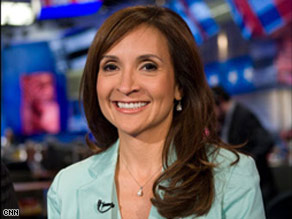Editor's note: Republican Leslie Sanchez was director of the Bush White House Initiative on Hispanic Education from 2001 to 2003 and is the author of "Los Republicanos: Why Hispanics and Republicans Need Each Other." She was not a paid consultant to any 2008 candidate. Sanchez is CEO of the Impacto Group, which specializes in market research about women and Hispanics for its corporate and nonprofit clients.

Leslie Sanchez says the Republicans must catch up to Democrats in their use of new campaign technology.
Ever since John McCain and Howard Dean in 2000 showed the Internet's potential for fundraising, the question was always whether the Web could be effective at "GOTV," or getting-out-the-vote.
Among young voters at least, Barack Obama has proven that it can -- and, in the process, he's uncovered a major flaw that cuts to the core of the Republicans' approach to party organization and discipline.
Obama poured many of his campaign's millions into his social networking operations on the Web, which his campaign rightly saw as critical to building grassroots support and enthusiasm.
A community organizer by training, occupation and nature, Obama saw his databases for the potential they represented -- an army of supportive voices, a legion of potential volunteers, and a division of precinct captains.
Such is the world not just of Chicago ward organizations, but of politics everywhere.
The McCain campaign, reflecting the broader skepticism I've seen in the GOP about the Web, doubted whether the Internet could get voters out of their Barcaloungers (or, in the case of younger voters, off their futons) and into the polling booth.
Michael Palmer, McCain's Internet director during the primaries, told ABCNews.com last June that if Obama's online efforts "don't have an endgame political benefit, then they don't help you at the end of the day."
On Tuesday, Obama showed the Republicans the Internet's endgame.
On Facebook alone, Obama signed up 2.4 million users as supporters, compared with just 624,000 for McCain. A Facebook virtual ticker challenged users to actually go out to the polls, and clocked more than 1 million by noon on Election Day and 5 million by the time all the polls closed.
According to the Center for Information and Research on Civic Learning and Engagement (CIRCLE) at Tufts University, the number of voters under 30 rose by 3.4 million compared with 2004.
About 66 percent of those voters supported Obama, compared with 32 percent for McCain. By contrast, the overall voting population gave Obama a much narrower margin of victory -- 53 percent to 46 percent.
In previous elections since 1976, according to CIRCLE, the percentage of young voters supporting the winning candidate varied by an average of only about 2 percentage points from the overall voting population.
At the least, young voters contributed to Obama's wins in North Carolina, Indiana, and Virginia.
When Mark Penn, then Hillary Clinton's chief strategist, chided Obama's supporters as "look(ing) like Facebook," he was right. While some of us over the age of 29 are just now mastering Twitter and Facebook, a UCLA survey of 272,000 college freshmen found that 86 percent spend "some time" each week on social networking sites like Facebook and MySpace.
Obama realized that the 70 million Americans on Facebook (the vast majority of them under the age of 30) have become accustomed to a Web experience that's interactive.
Web-based political social networking requires empowerment -- introducing well-trained, highly motivated local supporters to one another and then turning the campaign over to them.
McCain's official site included a social networking area, McCainSpace, but it was mostly an afterthought, competing for attention with messages from the candidate, campaign ads, issues summaries, photo galleries -- and of course the obligatory online donations and volunteer signups.
The Obama social networking site invited each new user to post a blog right away upon signing up. To the Obama Web team (which included one of the founders of Facebook), putting users in touch with one another was almost as important as putting the user in contact with the campaign.
Team Obama posted nearly 2,000 videos on YouTube, and the campaign contracted to build a text-messaging campaign that reached millions of voters geographically on their mobile phones. All told, it was a hefty viral marketing combination.
During the primaries, volunteers could sign in online, download a list of phone numbers and make calls from home to voters in the target states -- a virtual phone bank that other campaigns had to pay for.
Joe Trippi, the Democratic operative behind the Web-savvy Howard Dean campaign, was quoted in the New York Times noting Obama's progress: "We were like the Wright brothers," he said. Obama, on the other hand, "skipped Boeing, Mercury, Gemini -- they're Apollo 11, only four years later."
A college student and editor-in-chief of www.scoop08.com, Alexander Heffner, believes young voters were serious about voting this time around. "So many young people invested in him [Obama], unlike with Bill Clinton," Heffner told me.
The Obama campaign's use of the Internet will change campaign politics just as much as the fax machine and the autodialer did. If the GOP is going to compete in this growing tech world, they'll have to do more than just reverse-engineer the bells and whistles on Obama's Web sites.
They'll have to analyze Obama's entire approach to social networking -- a bottom-up, unruly approach that turns first-time voters into activists. That'll be easier said than done for a hierarchical organization that values order and discipline over all else (except, perhaps, seniority).
Nevertheless, if the GOP wants to compete on an even footing with the tech-savvy, social networking Obama-crats, they've got a real revolution ahead.
'Politics' 카테고리의 다른 글
| Indecision 2008: America's Choice (0) | 2008.11.10 |
|---|---|
| Obama "yes you can" (0) | 2008.11.10 |
| Emanuel brushes off 'hyper-partisan' charges (0) | 2008.11.10 |
| Dem leaders want Bush to help ailing automakers (0) | 2008.11.09 |
| N Korea Iran Policy Obama (0) | 2008.11.09 |


